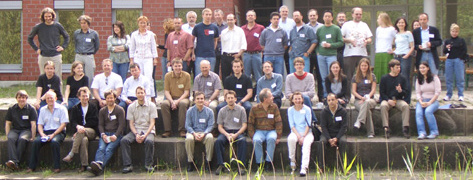Seitenpfad:
- Presse
- Pressemeldungen 2006
- International Workshop “Marine Genomics meets M...
International Workshop “Marine Genomics meets Marine Diversity”
A bundle of new technologies has emerged over the last years. Fast DNA sequencing (Pyrosequencing), DNA chips, proteomics and geographic information systems (GIS) to integrate oceanography, diversity and genomics are ready for application. The central question is now how to combine these tools to solve burning ecological questions like: Who is out there and what are they doing?
Last week an international workshop was held at the Bremen Max Planck Institute for Marine Microbiology. From 8 – 9 June 2006 sixty participants from eleven countries, including the USA presented state of the art results on marine microbial diversity and genome research and held lively discussions.The sessions covered the issues diversity, genomics, ecology, technology, and bioinformatics, including databases and portals. The workshop was funded by the European Commission as part of the activities of a large Network of Excellence called “Marine Genomics Europe” (www.marine-genomics-europe.org).
It has been underlined by the participants that biology has moved on from a single experiment endeavour to a high throughput science with the amount of data produced every day exceeding the ability of a single researcher to intellectually ingest this rich harvest. Only a tight connection between experts in biology and ecology with technology and bioinformatics will make it possible to identify the key players as well as the basic structural and functional elements of ecosystems, in which microorganisms play an important role. A better understanding of the forces driving marine ecosystems is the ultimate goal of marine microbial ecology and will help to manage protection and exploitation of natural resources and services in a sustainable way.
The organiser of the workshop Prof. Dr. Frank Oliver Glöckner summarises “These meetings are very important to establish interdisciplinary connections in order to join forces and intensify interdisciplinary research. We want to reach a better understanding of the cycles of matter with the help of classical ecology, genomics and information technology. This is dearly needed for predicting global change effects and modeling ocean ecosystems, which are earth support systems.”
For more information contact:
Prof. Dr. Frank Oliver Glöckner
[Bitte aktivieren Sie Javascript]
More Information can be found at www.metafunctions.org and www.microbial-genomics.de
Last week an international workshop was held at the Bremen Max Planck Institute for Marine Microbiology. From 8 – 9 June 2006 sixty participants from eleven countries, including the USA presented state of the art results on marine microbial diversity and genome research and held lively discussions.The sessions covered the issues diversity, genomics, ecology, technology, and bioinformatics, including databases and portals. The workshop was funded by the European Commission as part of the activities of a large Network of Excellence called “Marine Genomics Europe” (www.marine-genomics-europe.org).
It has been underlined by the participants that biology has moved on from a single experiment endeavour to a high throughput science with the amount of data produced every day exceeding the ability of a single researcher to intellectually ingest this rich harvest. Only a tight connection between experts in biology and ecology with technology and bioinformatics will make it possible to identify the key players as well as the basic structural and functional elements of ecosystems, in which microorganisms play an important role. A better understanding of the forces driving marine ecosystems is the ultimate goal of marine microbial ecology and will help to manage protection and exploitation of natural resources and services in a sustainable way.
The organiser of the workshop Prof. Dr. Frank Oliver Glöckner summarises “These meetings are very important to establish interdisciplinary connections in order to join forces and intensify interdisciplinary research. We want to reach a better understanding of the cycles of matter with the help of classical ecology, genomics and information technology. This is dearly needed for predicting global change effects and modeling ocean ecosystems, which are earth support systems.”
For more information contact:
Prof. Dr. Frank Oliver Glöckner
[Bitte aktivieren Sie Javascript]
More Information can be found at www.metafunctions.org and www.microbial-genomics.de

